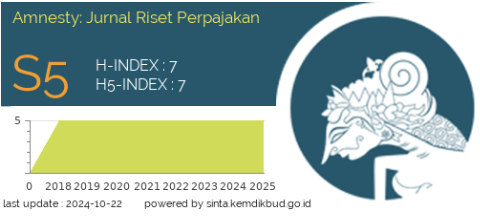Ethical Guidelines
Amnesty: Journal of Taxation Research, with registered ISSN number 1858-2195 (Print), ISSN 2686-5467 (Online), is a peer-reviewed journal, available in both print and online formats, and published twice a year. This statement clarifies the ethical behavior of all parties involved in the publication of articles in this journal, including authors, editors-in-chief, the Editorial Board, peer reviewers, and the publisher (Economics and Business Study Program, Faculty of Economics and Business, Universitas Muhammadiyah Makassar). This statement is based on the COPE (Committee on Publication Ethics) Best Practice Guidelines for Journal Editors.
Ethical Guidelines for Journal Publication
The publication of peer-reviewed articles in Amnesty: Journal of Taxation Research is a fundamental building block in the development of a coherent and respected knowledge network. It is a direct reflection of the quality of the work of the authors and the institutions supporting them. Peer-reviewed articles support and embody the scientific method. Therefore, it is important to agree on the ethical behavior standards expected from all parties involved in the publication process: authors, journal editors, peer reviewers, publishers, and the community.
The Taxation Study Program, Faculty of Economics and Business, Universitas Muhammadiyah Makassar, as the publisher of Amnesty: Journal of Taxation Research, takes guardianship responsibility for all stages of publication and acknowledges its ethical and other responsibilities. We are committed to ensuring that advertising, reprints, or other commercial revenues do not impact or influence editorial decisions.
Publication Decision
The editor of Amnesty: Journal of Taxation Research is responsible for deciding which articles submitted to the journal should be published. The validation of questionable work and its significance for researchers and readers must always drive these decisions. Editors may be guided by the journal’s editorial board policy and restricted by legal requirements regarding defamation, copyright infringement, and plagiarism. Editors may consult other editors or reviewers when making these decisions.
Fair Play
Editors should evaluate manuscripts for their intellectual content without regard to the race, gender, sexual orientation, religious beliefs, ethnic origin, citizenship, or political philosophy of the authors.
Confidentiality
Editors and any editorial staff must not disclose any information about manuscripts submitted to anyone other than the appropriate author(s), reviewers, potential reviewers, other editorial advisors, and the publisher, as appropriate.
Disclosure and Conflict of Interest
Unpublished material disclosed in a submitted manuscript must not be used in the editor’s own research without the written consent of the author.
REVIEWER’S DUTIES
Contribution to Editorial Decisions
Peer review helps editors make editorial decisions and, through communication with authors, may also assist authors in improving their papers.
Speed
Any selected reviewer who feels unqualified to review the research reported in a manuscript or knows that a prompt review cannot be made should notify the editor and excuse themselves from the review process.
Confidentiality
Any manuscript received for review must be treated as a confidential document. It must not be shown or discussed with others except as permitted by the editor.
Objectivity Standards
Reviews should be conducted objectively. Personal criticism of the author is inappropriate. Reviewers should express their views clearly with supporting arguments.
Acknowledgment of Sources
Reviewers should identify relevant published works that have not been cited by the author. Any statement that an observation, derivation, or argument has been previously reported should be accompanied by a relevant citation. Reviewers should also alert the editor to any substantial similarity or overlap between the manuscript under consideration and any other published paper of which they have personal knowledge.
Disclosure and Conflict of Interest
Privileged information or ideas obtained through peer review must be kept confidential and not used for personal gain. Reviewers should not consider manuscripts in which they have a conflict of interest arising from competition, collaboration, or any other relationship or connection with the author, company, or institution associated with the paper.
AUTHOR’S DUTIES
Reporting Standards
Authors of original research reports should present an accurate account of the work performed as well as an objective discussion of its significance. The underlying data should be accurately represented in the paper. A manuscript should contain sufficient details and references to allow others to replicate the work. False or deliberately inaccurate statements constitute unethical behavior and are unacceptable.
Originality and Plagiarism
Authors should ensure that they have written entirely original works, and if they have used the work and/or words of others, they have properly cited or quoted them.
Duplicate, Redundant, or Concurrent Publication
An author should not generally publish manuscripts that essentially describe the same research in more than one journal or primary publication. Submitting the same manuscript to more than one journal concurrently constitutes unethical publishing behavior and is unacceptable.
Acknowledgment of Sources
Proper acknowledgment of the work of others must always be given. Authors should cite influential publications that have determined the nature of the reported work.
Authorship
Authorship should be limited to those who have made a significant contribution to the conception, design, execution, or interpretation of the reported research. All those who have made significant contributions should be listed as co-authors. Where others have participated in certain substantive aspects of the research project, they should be acknowledged or listed as contributors. The corresponding author should ensure that all appropriate co-authors and no inappropriate co-authors are included on the paper, and that all co-authors have seen and approved the final version of the paper and have agreed to its submission for publication.
Disclosure and Conflict of Interest
All authors should disclose any financial or substantive conflicts of interest that could be interpreted to affect the results or interpretation of their manuscript. All sources of financial support for the project should be disclosed.
Fundamental Errors in Published Work
When an author discovers a significant error or inaccuracy in their own published work, it is the author’s obligation to promptly notify the journal editor or publisher and cooperate with them to retract or correct the paper.




12.jpg)